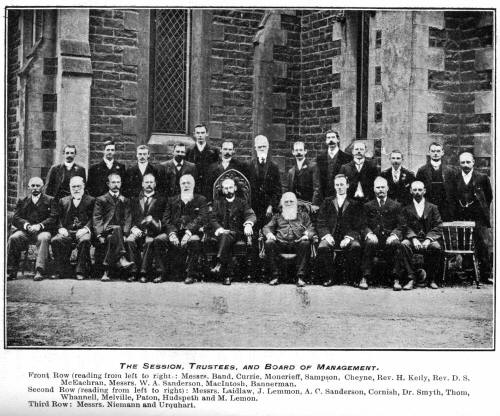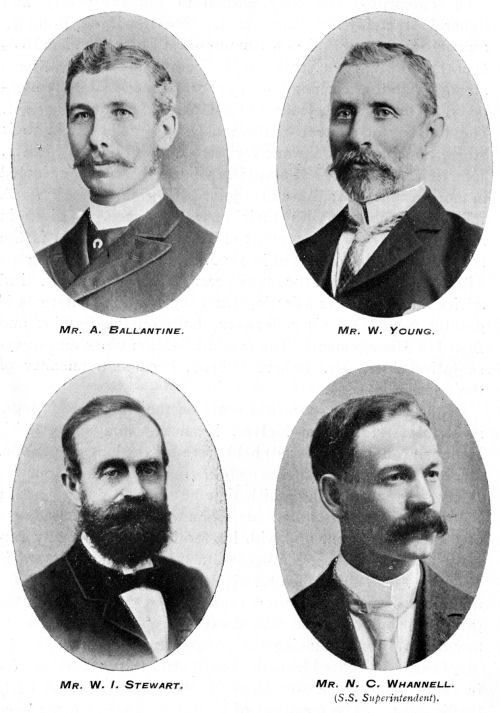|
According to our Presbyterian
polity of church government, the Session has effective control over the
spiritual life of the congregation, and all organisations in connection
therewith. The legal existence of the congregation, so far as its property
is concerned, is represented by trustees appointed for the purpose of
holding such property, whilst the duty of successfully managing business
concerns is placed in a Board of Management, whose proceedings, however, are
subject to control, in some instances, by the trustees, and in other
instances by the congregation, and in this latter respect the Session has a
kind of indirect supervision, because no meeting of the congregation may be
called without the sanction of the Session. On the other hand, the Session
is in a measure controlled by the Board of Management, because it is the
latter body which alone can deal with the expenditure of moneys received for
the upkeep of the congregation. Although these bodies have somewhat
conflicting jurisdictions, still in practice, and when everything is done in
a Christian spirit, they generally work very well together, and a
congregation's work is always carried on much more smoothly when all these
bodies are in existence. The Presbytery and General Assembly, as the higher
courts of the Church in general, of course, have certain controlling
influences; but the genius of Presbyterianism allows a large measure of
practical self-government to each congregation.

The manner in which the
different internal organs of government arose in St. Andrew's church was in
the inverse order to that related above. The great drawback in the early
years of the congregation's existence was that it had no Session. The Board
of Management is as old as the congregation itself. The first trustees were
gazetted in 1856; but the Session did not come into existence until ten
years later. In June, 1855, Messrs. Hugh Campbell and William Pender, who
had been elders in the Free Church of Scotland, were elected by the
congregation as elders of the "Gaelic Church, Melbourne." At a previous
meeting three other gentlemen had been nominated, and had refused to act.
The two gentlemen named seem also to have refused office, as no induction
ceremony was ever held, and no meetings of Session are recorded. At the same
meeting, a number of gentlemen were elected as deacons, but it was
afterwards decided by the Board of Management that "as it was understood by
the managers, in terms of their election, that they had the power of adding
to their number, all those now acting as deacons be assumed as managers, to
act as such until a deacons' court has been regularly- formed." This latter
event never happened. At the congregational meeting referred to, Messrs.
Coiler Robertson, David Walker, Donald MacDonald, Alexander MacLean and
Robert Lawson were nominated as trustees, but their names were not gazetted,
and at a meeting held during the following year, Messrs. Robert Lawson,
Alexander MacLean, George Gordon Cameron, James Robertson and David Mathew
Watson were nominated, and these nominations having been accepted by the
Government, these gentlemen thus became the first trustees of the church
property, which was described in the Government Gazette as " the land set
apart at North Melbourne 'at Carlton' as a site for Free Presbyterian Church
purposes under the provisions of the Act 16 Vict. No. 28." It is interesting
to note that the official signing the proclamation, "By His Excellency's
command," was Mr. Andrew Clarke, who afterwards, as Sir Andrew Clarke, was
Agent-General for Victoria for many years. It is also to be observed that
the land was reserved, according to the proclamation, "for Free Presbyterian
Church purposes," and not specially for Highlanders and services in the
Gaelic tongue, although in other Gazette notices, dealing with the property,
it is referred to as the " Gaelic Church." The trustees did not receive a
Crown grant of the property until after the disturbances in 1859. An
explanation is thus afforded of the fact that the congregation was unable to
give the Bank of Victoria a security over its property whilst the building
was being erected in 1855 (assuming that it could have taken steps to do so
if it had had a Crown grant), and in consequence the personal security of
individual members was required as stated above. [See
App. A. for the history of the trusteeship of the property.]
We see that the Board of Management
absorbed the deacons on the ground that in terms of their election they had
the power to add to their number. In the early years of its existence, the
Board accordingly fluctuated with regard to the number of members. After
some years, only those elected by the congregation seem to have acted, but
uniformity in election was not secured until 1869 when, immediately after
the arrival of the Rev. D. S. McEachran, the whole of the managers resigned,
and it was decided to elect a new Board of sixteen members, in accordance
with the Rules of the Church. The Board has since continued to consist of
sixteen members, eight of whom, in the ordinary course of events, retire
each year.
Before the Session was established,
the Board of Management claimed
very high powers, and, in fact, acted as the supreme authority in
spiritual as well as temporal matters. This assumption of jurisdiction was
in a large measure responsible for the conflict with the Rev. W. Fraser, who
claimed that the Board had exceeded its functions with regard to its action
over the question of Union. If there had been a Session then, matters might
have assumed another aspect.

The Session was called into
existence during the ministry of the Rev. Angus Macgregor. On 15th March,
1866, a meeting was held of an Interim Session appointed by the Presbytery,
consisting of the Rev. A. MacGregor, Moderator, and Rev. James Caldwell,
Collingwood, and Rev. J. Bagley, Richmond, assessors. The record states:
"The Moderator having represented that the congregation was as yet without
elders, and that a general desire was expressed, both by members and
adherents, that this want should be supplied, authority was given him to
summon a congregational meeting, and take the usual steps for the election
of four gentlemen to fill the office of the eldership." The necessary steps
were then taken, the members voted on the question, and on 19th April, 1866,
Messrs. John Manson, Malcolm MacQueen, and Donald Ross were duly ordained,
the clergymen taking part in the ceremony being the Revs. A. MacGregor,
James Caldwell and Robert Leishman. Mr. Manson was appointed first Session
Clerk. Mr. MacOueen alone of these three earliest members of Session is now
alive. His two former colleagues died only within the last year or two.
After Mr. McEachran's arrival, a number of able and earnest Christian men
were added to the Session, which became a body of which any congregation
might be proud. At one time there were no less than fifteen members. The
work of a number of these gentlemen has already been referred to. For length
of office, Messrs. Ewen Henderson and John Waugh have pride of place, each
having occupied his seat for a quarter of a century. Mr. Henderson was also
a manager for fifteen years in addition, making altogether forty years'
service as a member of the Board of Management. Next to these gentlemen, in
order of length of service, come the late Mr. W. I. Stewart, Mr. W. Young,
and the late Mr. D. H. Valantine, with respective records of 21, 19 and 17
years. Messrs. Stewart and Young were also managers for some years, while
Mr. Valantine, who succeeded Mr. Manson as Session Clerk, held that position
for seventeen years. Other prominent members of Session, III the days gone
by, were Mr. Walter Thomson, who was elected in 1869, and died in harness in
1883 ; Mr. David Howat, elected in 1872, and holding office till his death
in 1885; the Rev. David Chapman, whose work has already been noticed; and
Mr. David McMurtrie, who at the time of his death, in 1889, was the oldest
elder in Victoria, having been one of the earliest elders in Scots' Church,
and one of the founders of John Knox Church, which was formed out of
sympathy with the Scottish Disruption of 1843. Messrs. Howat and McMurtrie
each represented the congregation in the Presbytery and General Assembly for
many years. Messrs. David Brunton, Samuel MacGregor, William Hamilton, Eli
Chew, Thomas Hudspeth, the Rev. W. H. Scott and Mr. Henry Adamson, who have
all now gone to their long home, are still affectionately remembered by many
for their lives of usefulness in days long past. The families of several of
them have also followed in their steps, and done good work for the
congregation. Messrs. John Lowden, Peter Flett and John Whannell, who were
elected in more recent years, have also joined the great majority. A full
list of elders, with their terms of office, is given in Appendix B. Of the
present elders, Mr. John Thom is the senior, having been elected in 1890. He
has been connected with the congregation for many years, and his sound
practical advice on all matters affecting the congregation's interests is
greatly valued by his colleagues, both on the Session and Board of
Management. The present Session Clerk and representative elder, Mr. Robert
Cheyne, became a member of the Session in 1893.
Of the many who have held
seats on the Board of Management, Messrs. Duncan McIver, Kenneth Gunn and
Patrick MacLean (all now deceased) held office for the longest periods. Mr.
McIver, who died in November, 1900, was a manager for thirty-six years,
during which time he took an active part in the congregation's affairs. Mr.
Gunn was one of the founders ,of the congregation, and with his family
rendered many services to the church. He became a member of the Board in
1856, and held that office till his death in 1890. He was for a number of
years treasurer, and also did good work on the grounds committee, and was
always a generous supporter to any scheme for advancing the congregation's
welfare. Mr. MacLean, who retired from the Board after thirty years' service
in 1896, was also a worshipper in the church in the ear) Y Gaelic days. The
members of his family have also rendered valuable services in many
directions. The late Mr. John Gordon, who died recently, was a prominent
member of the Board for many years in the early days, having been first
elected in 1857. Of the present members of the Board, Mr. David Bannerman
has held the position of manager longest, having been originally elected in
1880. During his long term of office, he has done excellent service as
secretary for some fourteen years, and treasurer for about eighteen months.
He has held the position of secretary for a longer period than anyone else.
The longest occupant of the position of treasurer was Mr. Alexander
Ballantine, who has served the congregation well in many capacities, in
addition to his skilful handling of financial matters for over ten years.
The present secretary, Mr. J. W. Sampson, has been connected with the church
for many years, and has done good work as an elder, manager and Sabbath
School teacher. The present treasurer, Mr. R. B. McIntosh, has been an elder
for some years, and the finances are well looked after by him, with the
assistance of Mr. E. P. Moncriff. Messrs. Urquhart and Melville, who have
been members of the Board for some years, were baptized in the church in the
early Gaelic days, nearly fifty years ago, and have continued with the
congregation until the present.
 |

